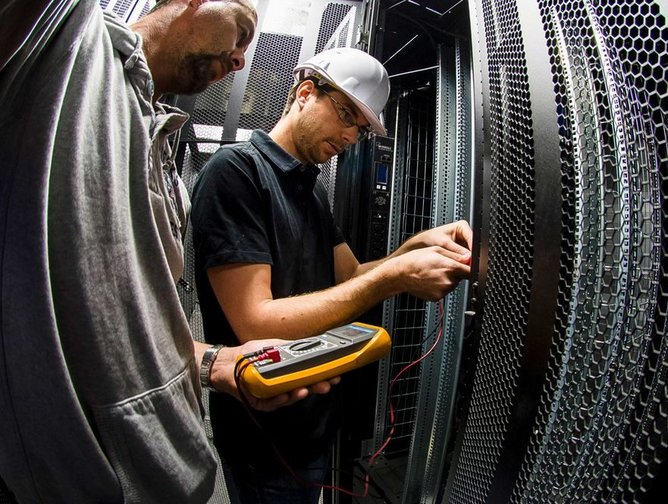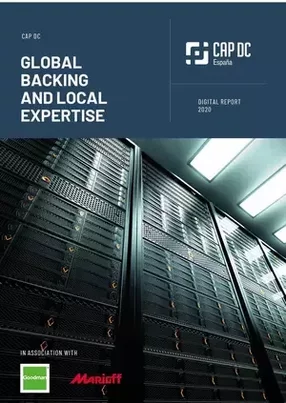CAP-DC España: Data centre engineering for Europe and Africa
According to the data analysis specialist Arizton, the data centre/colocation market in EMEA was worth around US$14bn in 2019. It's a burgeoning market, driven by factors like the EU's General Data Protection Regulation (GDPR) and rapid adoption of internet-based services among businesses in the Middle East and Africa region.
The Cap DC Group, a subsidiary of the leading French Cap Ingelec brings together local engineering firms in Southern Europe and Africa to build data centres to meet this demand, and has been ranked among the top 15 global data centre engineering firms by Arizton. While its core business is data centre engineering, increasingly it is offering its clients in southern Europe and francophone Africa the option of EPC or turnkey construction contracts, says its Managing Director Antonio Ríos Suanzes.
Antonio came on board in 2017 to set up the company's headquarters in Madrid. In that time his team has grown to eight, turnover to €5.5m, and revenue is targeted to reach €10m by 2022.
“Madrid is seeing strong growth in tier 2 of the European data centre market thanks to the increase in subsea cables reaching the Iberian peninsula,” he says. “We foresee huge growth in Madrid and Barcelona over the coming years.”
Cap DC has also begun its expansion into Milan, he adds, and Microsoft announced recently that it will build data centres in Greece, while Cap DC delivered two colocation projects in Turkey in 2020.
With the southern Europe data centre market set fair, he notes that Africa is a completely different market. The Madrid company has six offices in Africa from Morocco to Senegal to Ghana and Cameroon. In these markets, it's all about potential. Apart from South Africa the tech giants (GAFA) have no foothold yet and very few pan-African colocators are active.
“The market is still mostly driven by telcos like Orange, or by the public sector,” says Antonio. “For example, we are working for the national data centre agencies in Senegal and Guinea. The size of the data centre market in Africa is currently far smaller than in Europe, but we consider that with rapid population growth and the real innovation capability across the continent, it will equal the rate of development in Europe within five years.”
He is encouraged in this view by African leadership in mobile payment and its innovations in e-agriculture and e-health business.
Wherever it is to be built, time to market is the most important consideration for data centre operators and this is where Cap DC derives a distinct advantage from its deep engineering know-how and the resources of CAP Ingelec.
Flexibility and modularity are its priorities. Power usage effectiveness (PUE) driven by modern cooling systems such as direct and indirect free-cooling and choosing the right location are always important, but design flexibility must cater for the unknown final requirements of the final client.
“In our view, the technical solution for a data centre client is a combination of merging operator requirements (sometimes pre-defined in the best-practice policies of the company) with the skill to adapt these requirements to local regulations as necessary, and to validate construction feasibility in a short timeframe,” he says.
The contracting model developed by Cap Ingelec and Cap DC has been a major growth factor since 2015, Antonio feels.
“The difference in approach between a general contractor and an engineering specialist is clear. The turnkey contract model we offer our clients focuses on time-to-market. Between our group infrastructure and our local representatives, we can provide full governance of the projects, including licensing, securing power supplies and managing all legal issues: this enables us to commit to a budget and schedule with the client and stick to it.
“This model has helped many of our clients not only to design but to deliver their data centres on time. We are very gratified that more clients are trusting us with the full design and construction of their projects. It's convinced us that this is the construction model that fits this market.”
For Antonio Ríos Suanzes, the key to an effective turnkey solution in the data centre industry is to have the right collaborators, partners and suppliers in place. A good example is the fire protection system, which needs to be planned at an early phase of the project to ensure a system that is fit for purpose and protects the data centre through its entire lifecycle.
Taking into account every possible detail during the project planning stage means less need to make changes later. Making changes to the routing of the pipe network, for example, could disrupt operations. Also, fire suppression in data centres can be challenging due to the high airflow and the increased power density of servers. The upgraded FM Standard 5560 incorporates new fire test protocols for data halls and subfloors: long-term Cap DC supplier Marioff provides a high-pressure water mist solution, a very reliable fire protection system focused on total cost of operation (TCO) and with OEM support 24/7, says Antonio.
“We manage construction but we are not a supplier company, so we are delighted to bring to the client the quality and performance of our suppliers.” Close communication across the entire value chain is his mantra: “If one partner has a problem, the others have a problem too.”
Strategic partners are equally important. Private equity and hedge funds are increasingly interested in data centres as an alternative to their logistics investments. The global property group Goodman is setting the standard on this shift of emphasis and is a key partner for Cap DC.
“Goodman has the financial resources and strong local teams in key locations such as Frankfurt, Paris, Amsterdam, Milan and Madrid,” says Antonio. “Its group strategy is to purchase a plot, secure the power infrastructure (a specialised process in a complex and regulation-fraught environment), and then invite interested parties. Once the data centre operator is on board, Goodman will support construction and rent it to the operator. This model speeds up delivery by outsourcing plot selection and power due diligence. In Madrid, we are talking 6-12 months saved on ready-for-service date.”
Throughout 2020, every industry has had to face the challenges posed by Covid-19, though the situation has boosted the data centre market.
“We consider that this pandemic has boosted digitalisation more than any new product or marketing campaign,” says Antonio. “We expect growth in digital services that will require more investment in data centres and faster development of tier 2 cities like Madrid, Monaco or Bordeaux. Internally, in Cap DC we were prepared for a 'smart work' period and we are very proud of how the team has reacted to this situation. The technical team has been working from home and the construction team have adapted their schedule to keep the business running and minimize the impact.”
The dramatic uptick in demand will not decline when Covid is finally vanquished, he believes, as business consolidates the efficiencies it has been forced to adopt.
In a city like Madrid, securing power supply for new data centre capacity at strategic locations can be a limiting factor, he notes: “We have identified power supply and infrastructure between substation and data centre as a red flag that was delaying or even withdrawing projects. To tackle this, since 2018 we have offered a consulting service to deal with the electricity provider, securing power alongside a specific turnkey contract to develop this infrastructure. We are very happy with how this has impacted our business and we have been growing turnover every year.”
This success is getting recognised: Cap DC recently received an award as the leading company in Data Center Construction in Spain in 2020 from La Razón newspaper, one of Spain's most influential.



